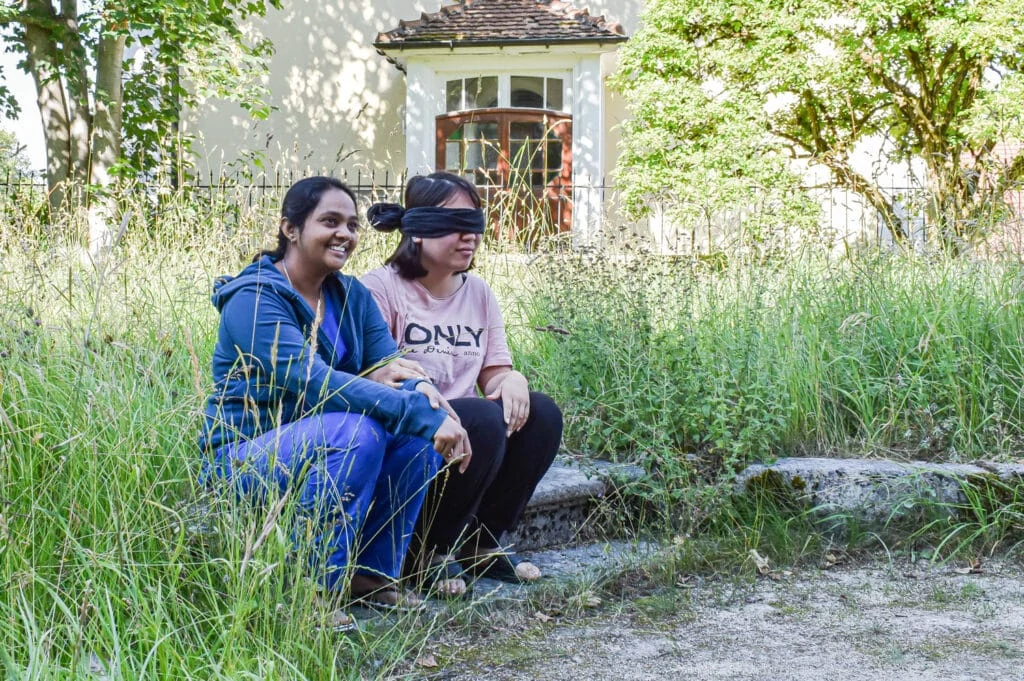Many young people with an escape background are under enormous psychological pressure in Switzerland. In addition to xenophobia, uncertainty as to whether they will be allowed to stay in Switzerland, culture shock and the language barrier, the traumatic experiences put a great deal of strain on these young people. High time for a power-up in the picturesque Jura. In the MePower workshop, young refugees learn about their strengths and resources and make new contacts.
Carefully Ava puts one foot in front of the other. She has already made one step, now comes the steep part. She can't pat herself down. Those are the rules. All that remains for the young Afghan woman is to rely entirely on Tushari, who gives her instructions and whose eyes are not blindfolded. "Watch out, here comes another one". Ava masters the steps and is led by Tushari from Sri Lanka into the garden where the two of them sit in the sun.
With the exercise "Trust blindly" the participants should playfully sharpen their sense for what gives them the necessary security in such situations. "For most of them, good communication was important in this game," says co-project manager Sylvia Valentin, "they had to know what was right in front of them and how to behave. A challenge, the young people have different native languages.
Great psychological pressure
How much the game resembles real life is probably a bit different for all participants of the second MePower workshop. One thing is certain, however, that the young refugees in Switzerland are not lacking in challenges: restrictions during the asylum procedure, dealing with the authorities, finding their way into a foreign culture and, last but not least, social exclusion. And what is even more serious: they constantly carry with them the images and impressions of traumatic experiences in their country of origin and during their flight.
The Federal Office of Public Health (FOPH) estimates that 50 to 60 percent of asylum seekers suffer from trauma sequelae. Almost one in three people suffer from post-traumatic stress disorder, one in three from depression and an overwhelming majority from chronic pain, write the psychologists from the Psy4Asyl network.
However, there are too few psychotherapeutic services available in Switzerland. The consequences of untreated psychological problems have a negative impact on the social and professional integration of migrants, where they face high demands, Psy4Asyl continues. This causes additional costs in the long run.
For many young people, the loss of their family and the supportive social environment is a major burden. Under this psychological pressure, it is a great challenge to make new contacts and build a healthy social environment. But this is exactly what is important for a good integration and as a basis for a treatment of the trauma. Low-threshold psychosocial support can help the young migrants in this process. But here, too, there is a lack of offers.
With 1 to 10 to the target
terre des hommes schweiz has many years of experience in working with traumatised young people through its project work in southern Africa and Latin America. In our projects abroad we successfully work with the method of the Solution Focused Approach (SFA). Instead of focusing on the problems and weaknesses of those affected, SFA focuses on their strengths and resources. They learn to recognise and develop these so that they can become active on their own and give their lives a positive turn.
For example, with intermediate steps from 1 to 10 In this exercise the participants thought about a goal that they would like to achieve. Ava writes down that she wants to find a place to stay for her sister. Others write that they would like to get a training place or learn German. The goal is given the number 10, and now everyone is thinking about whether they are only at the beginning, at step 1 or 2, or whether they have already moved on. And what do the remaining steps stand for? What has to happen for the project to make a step forward.
leave problems
The participants got to know such and other exercises during the four-day workshop in the Jura, which took place for the second time in July. The teenagers and young adults with different residence status discovered playfully how many resources, strengths and abilities they have.
With our support, they were able to start developing personal coping strategies and visions for the future and to find out what concrete, small steps they could take. They discovered what room for manoeuvre they have despite all the restrictions and how they can make use of it. In return, they were allowed to leave their problems behind for once and become clear about what their own strengths are.
"It was impressive how well the young migrants knew what their next steps were," said co-director Sylvia Valentin. "They have a clear idea of the training they want to do and the professions they want to learn." They should not be held back by the hurdles of their residence status. And with a healthy environment, they have the power to come to terms with their history and settle in Switzerland.
You can support here our projects in Switzerland, Africa and Latin America, among other things with traumatised young people and for the prevention of violence.


